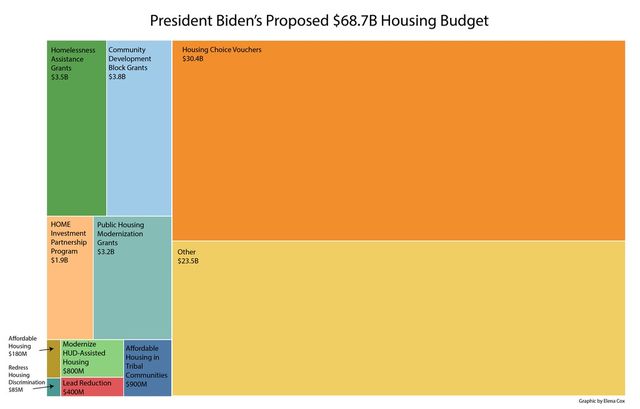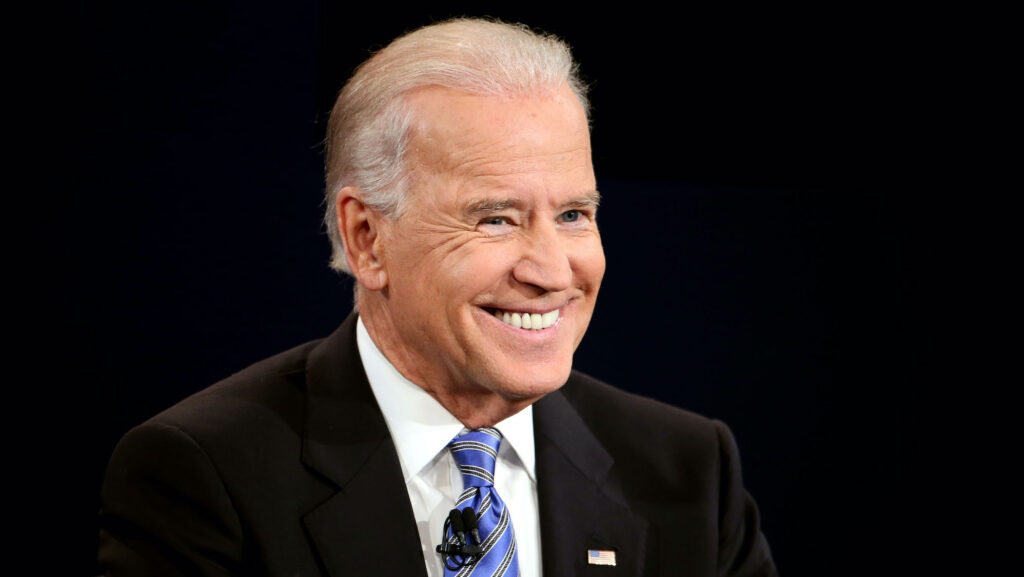
Getty Images
President Joe Biden appears determined to make good on his campaign pledge to bolster the supply of affordable homes by directing more federal dollars toward housing.
After four years of his predecessor’s attempts to take a hatchet to the budget of the U.S. Department of Housing and Urban Development, Biden seeks to increase HUD’s funding by 15.1%, to $68.7 billion, in his first budget proposal. The money would go toward assisting low-income renters and increasing the availability of lower-cost homes.
“President Biden’s [budget request] turns the page on years of inadequate and harmful spending requests and instead empowers HUD to meet the housing needs of families and communities across the country,” HUD Secretary Marcia L. Fudge said in a statement. “I look forward to working with the president to advance HUD’s critical priorities.”

While the president’s goals are ambitious, the $1.52 trillion partial budget released on Friday must first receive congressional approval. The full budget is expected to be released later this spring.
The HUD funding, if it comes through, would be in addition to the $27.4 billion that was in this year’s pandemic relief package. The president’s yet-to-be-approved infrastructure plan also sets aside $213 billion to preserve, retrofit, and create more than 2 million affordable housing units for low- and middle-income Americans.
“The increase in HUD’s budget represents a wish list of things the president wants to implement. It’s also an acknowledgement of the harsh realities facing America’s families today,” says realtor.com® Senior Economist George Ratiu. “For today’s buyers, homeownership is moving further out of reach because of steep prices and rising mortgage rates. Access to affordable housing that allows a family to move up the ladder is also sorely lacking.”
However, some housing experts are skeptical that this budget, even with the big funding boost, can tackle the severe shortage of housing and affordability issues that are plaguing each corner of the nation.
“In the past when we’ve had similar efforts, how really successful have we been?” asked Jim Gaines, an economist at Texas A&M University’s Real Estate Research Center in College Station. He pointed out that only a relatively small number of people in the country stand to benefit from the budget increases. “But it sure beats not doing anything.”
Affordable housing is one of President Biden’s priorities
For years, the nation has suffered from a severe shortage of affordably priced housing, a problem that has worsened drastically during the pandemic. The president plans to address the issue by spending $1.9 billion, a $500 million increase, on constructing and rehabilitating more reasonably priced rental homes. This includes $180 million to put up 2,000 new units for affordable housing for the elderly and disabled.
“That’s great,” says Gaines. “But when you get down the number of homes that are going to get the benefit of this and then spread it geographically across the United States, the impact is going to be on a relatively small number of housing units.”
More low-income renters and the homeless would receive assistance
The president hopes to offer housing vouchers to help an additional 200,000 low-income families pay rent. Priority would go to the homeless and victims of domestic violence.
Currently, about 2.3 million renters rely on housing choice vouchers to afford a roof over their head. The budget calls for $30.4 billion to be added to the voucher program to fund those additional families.
The president also plans to make it easier for lower-income families of color to move into neighborhoods that offer more opportunities, such as better schools or more access to public transportation and jobs.
“Unfortunately, the ZIP code you’re born into has an impact on your life expectancy, the kind of education you’re going to get, the food that’s available to you,” says Pam Kisch, executive director of the Fair Housing Center of Southeast & Mid Michigan. “Giving people more choices is always a good idea. But it’s also important to make every neighborhood in the United States a neighborhood of opportunity.”
Biden would also attempt to lift more than 100,000 families out of homelessness. The president is aiming for a $500 million increase in homeless assistance grants to move people into stable housing as well as to help prevent homelessness.
This would be in addition to the $5 billion set aside for emergency vouchers that help secure housing for folks who don’t have a place to stay or who are at immediate risk of homelessness.
“The budget is a step to ensure government protections to many on the margins,” says Ratiu.
Environmentalism and health are also covered in the budget
Environmentalism is another priority of this administration. The president is requesting $1.7 billion to retrofit homes, schools, and other government buildings to be more energy-efficient. The budget also sets aside $800 million for retrofitting HUD-supported rental properties to become more energy-efficient, which will save tenants money on their utility bills, as well as making the structures more resilient to natural disasters such as flooding.
The budget also builds on one legacy of the prior administration. Former HUD Secretary Ben Carson was committed to lead paint remediation, as the paint can cause serious health issues in young children. This budget calls for an additional $40 million, for a total of $400 million, to be spent on getting rid of lead paint and other home-based health hazards.
The budget aims to combat discrimination
The president’s budget set aside $85 million to combat discrimination. The money would be distributed in grants to local fair housing organizations to fund enforcement. This means when someone is accused of something like refusing to rent, sell, or lend to a qualified applicant, the fair housing organizations can investigate. It would also provide additional education to housing entities to prevent discrimination from happening.
“Housing discrimination and housing segregation color every aspect of our lives,” says fair housing advocate Kisch. “Fair housing centers have been woefully underfunded for decades. This is one step in the right direction.”
About $900 million would go toward tribal communities to expand the supply of affordable housing, improve current housing stock and infrastructure, and provide additional economic opportunities.
Native Americans are seven times more likely to live in overcrowded homes and five times more likely to suffer from plumbing, kitchen, and heating problems than the rest of the nation, according to the budget.
The post President Biden Takes On Housing Crisis in Proposed Budget; Could It Bring Home Prices, Rents Down? appeared first on Real Estate News & Insights | realtor.com®.
